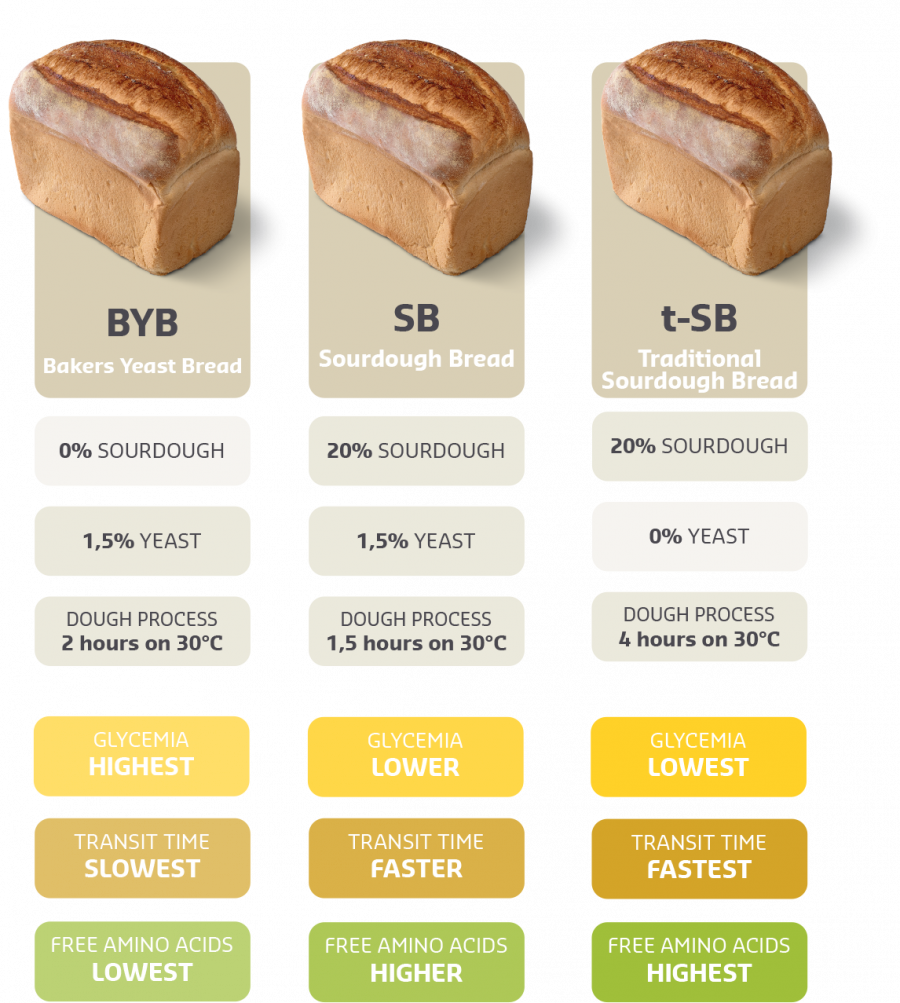Sourdough & Digestibility - I
LET’S TALK ABOUT DIGESTIBILITY & BREAD. Did the last bread you ate give you a satisfied feeling? And if so, for how long? Maybe you experienced issues like bloating, or cramps? These are undeniably experiences that influence our appreciation of
bread. Based on extensive research by a professor of microbiology at the University of Bolzano and Bari, Italy, this blog is an introduction to the topic of bread digestibility!
WHY DIGESTIBILITY?
Your digestive system breaks down food into its chemical components - carbohydrates, fats, proteins, that the body then absorbs and uses for energy. This digestive flow doesn’t always run smoothly. Various factors - what we eat, and how we eat - can disrupt digestive health. On the other hand, certain foods are more digestible than others, and can help us to maintain a healthy digestive tract. The digestive system - from the mouth to the colon - is actively involved in the entire journey of food through the human body. The gut is the final part of this digestive system. It has long been known that microorganisms in the human gut play an important role in digestive health. Now, recent research indicates that gut bacteria may impact wider aspects of health, including obesity and metabolic health. Given the mounting body of evidence that links gut health to overall health and well-being, it shouldn’t come as a surprise that people's awareness on this topic has been rising over the past few years. And, now, following COVID-19 lockdowns, gut health has moved to the top of people’s health agenda.
FERMENTATION AT THE START OF BETTER DIGESTIBILITY
To explore ways of optimizing bread’s digestibility we returned to the very essence of bread, namely, the way it’s fermented. With bakers typically choosing between commercial baker’s yeast and sourdough, new research done by Professor Marco Gobbetti has shown that the latter not only impacts breads’ volume, taste and texture, but also has a significant impact on its digestibility. In his latest work, Prof. Gobbetti compared the digestibility of three types of bread, of which two were made with sourdough. The results confirmed what was already known empirically and partially proven by previous research: sourdough fermentation and more in general the longer fermentation process positively impacts the breads’ digestibility.

How do you research fermentation?
Breads’ traditional fermentation technology - sourdough - houses not only yeast, but also a huge variety of lactic bacteria. Today, modern technologies make it possible to do detailed research on these microbes. Gobbetti explains further: “Fermentation is a traditional technique that started I don’t know how many centuries ago. We now have all sorts of techniques that help us explain the secret behind fermentation. We’ve the ability to look into the interaction between microbes. We’ve the ability to better understand the microbes that are in a sub-dominant position. The techniques now give us the possibility to better understand this complex network and these metabolic interactions between microbes, which in my view is the secret of fermentation.”

How will this new research impact the bread industry?
It is well known that sourdough brings taste to breads, but the professor sees the benefits of sourdough expanding beyond sensorial benefits. “The future of sourdough fermentation research is to demonstrate how it offers advantages to human health from a nutritional point of view.”
When we arrived at the laboratories in Bolzano, Prof. Gobbetti showed us the ‘SHIME’
The SHIME is a brand new simulator that models the human intestinal tract. Prof. Gobbetti explains that this equipment has taken his research to the next level. “This equipment - the SHIME - can reproduce almost the same conditions as our human intestinal track … with the advantage that all the conditions are monitored. With it, you can study the effects of particular dietary habits, nutrients or foods, under standardized conditions. Currently we are using this equipment to confirm the better digestibility of sourdough bread compared to the baker’s yeast bread and chemical-leavened bread. We’re hoping to see whether sourdough may have an effect on the diversity and functionality of the intestinal microbiome of humans.” It is clear that science is helping us to better understand the benefits of natural fermentation.
